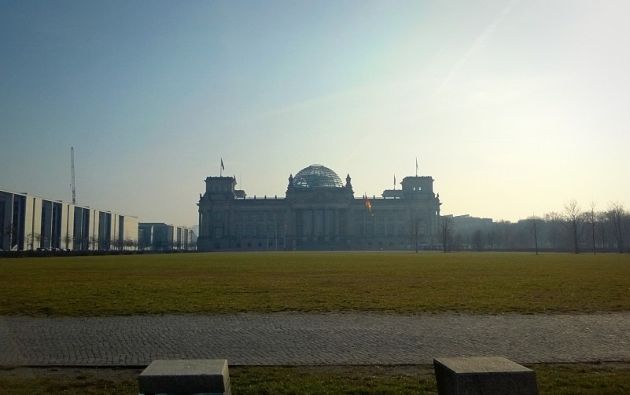German elections: An open race to the finish line

In three weeks, German citizens aged 18 and older will vote for a new parliament, the Bundestag. The campaigns of the competing political parties for the general elections of September 26th are in full swing. Hardly a day goes by without a televised debate among candidates vying for the vote of men and women. Opinion polls suggest seven parties will be represented in parliament. The forecasts also suggest a close race among the three leading parties and their respective candidates for chancellor of Germany.
The elections mark a watershed for politics in Berlin. For the first time, three candidates - two men and one woman - seek to succeed Angela Merkel, the permanent resident in the Berlin chancellery during the past 16 years. Moreover, given the dynamics of German party politics during the past decade, a ‘Grand Coalition’ between the Christian Democrats (CDU) and the Social Democrats (SPD) can be ruled out. Both governing parties have exhausted such an arrangement and their respective voters are emphatically opposed to it.
The days of two-party coalitions in Germany have come to an end in various regions of the country. Now the same will happen at the federal level. A third partner will be needed to form a governing majority in the Bundestag. What shape and form such a threesome arrangement can look like is currently the most intensely debated issue of the electoral campaign. The pro-business Free Democrats (FDP) or the Left Party (Die Linke) are prepared to listen to offers. However, nobody is willing to entertain a cooperation with the right-wing populists of the Alternative für Deutschland (AFD).
The Green Party had hoped that its electoral rise during the past years and frequent participation in regional governments could lead its candidate, Annalena Baerbock to scale the gates of the chancellery in Berlin. Alas, allegations of plagiarism, her belated registration of secondary income with the Bundestag’s administration and unforced errors in the writing of her curriculum vita have significantly dented her meteoric ascent and the unrealistic expectations of her campaign managers. The ‘Greens’ could still play a vital kingmaker role in coalition negotiations. But if they participate in government their position would look much more like a junior partner.
For most of the past months the leading party in opinion polls was the CDU and its candidate for highest office in Germany, Armin Laschet, the current prime minister of the region of North Rhein Westphalia. But like Baerbock, Laschet became embroiled in allegations of plagiarism. Unlike his female competitor, Laschet has experience in executive office. However, he cannot count anymore on the ‘Merkel bonus’ that gave the CDU victory during past elections. Another of Laschet's shortcomings is his uncanny ability to step on banana peels. In a recent faux pas he was photographed laughing while visiting towns devastated by the flash floods in Germany in July. The pictures resonated deeply among an electorate that is willing to punish any transgression by political elites. Three weeks before the elections there is little to indicate that the CDU and Laschet can reverse their free-fall among voters.
If there is a story line during this campaign that hardly anybody predicted at the start of 2021, then it is the return to electoral relevance of the SPD and its candidate for chancellor, Olaf Scholz, the current minister of finance and vice-chancellor in Merkel’s cabinet. Contrary to his other two competitors, Scholz has avoided unforced errors. Neither has he written a book. He therefore does not have to address uncomfortable questions on campaign stages about plagiarism, correct citation methods and copyright issues. For a party languishing in the range of 15 percent in early 2021, the prospects of the SPD being neck-on-neck with their perennial rivals from the CDU is as unexpected for the former as it is a political catastrophe for the latter.
For many voters in Germany Scholz is considered a safe pair of hands. His biggest asset is his capacity to be seen as representing the Social Democrats without being identified with the SPD of years past. Given that the outcome of these elections marks the farewell of Angela Merkel, many voters are searching for a credible, reliable alternative without risking too much when casting their ballot. It appears that this desire for stability is creating an electoral dynamic which helps Scholz and translates into unexpectedly good poll numbers for the SPD.
But the changing of the guards in Berlin could still take time after the general elections. Three-party coalitions at the federal level are complex arrangements in Germany. Multiple combinations appear possible. Such coalitions require arduous negotiations and intricate compromise on vexing policy issues ranging from the Covid-19 pandemic, migration flows expected from Afghanistan and how to address climate change in Germany after the flash floods this summer. Until a new tripartite coalition government is reached chancellor Merkel may find herself longer in office than she initially planned after casting her ballot on Sunday, 26th September 2021.
Jens Bastian is senior policy advisor at ELIAMEP.
*This is the first of four contributions which will analyze the run-up to and outcome of the general elections in Germany. Each weekly contribution will address a specific aspect of this electoral campaign. The last contribution will discuss the options available to different parties following the vote of 26. September 2021.
 Podcast - Whose property? Greece’s housing challenges
Podcast - Whose property? Greece’s housing challenges Can the Green Transition be just?
Can the Green Transition be just? Where is Greek growth coming from?
Where is Greek growth coming from? Bravo, Bank of Greece
Bravo, Bank of Greece